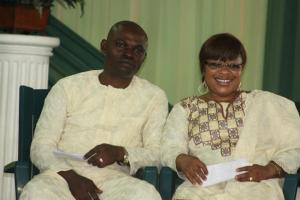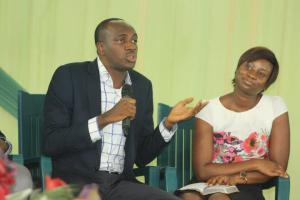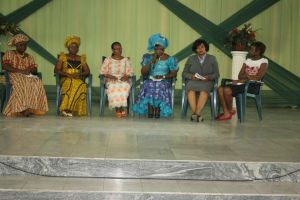Notes from Sunday 17th February, 2013..
Panel Discussion 1: Living Successfully with a Wife Batterer
Key Passage: Ephesians 5:22-33
Panelists: Deaconess Charity Ubah, Deaconess Maureen Nnamdi, Deaconess Bukky Emeh, Deaconess Ogo Ezeobi (Panel Lead), Mrs. Oby Chikwado, Deaconess Kieni Ebenuwah
The panel discussion began with the panel lead, Deaconess Ogo Ezeobi making a distinction between non-Christian and Christian men who batter their wives.. For the purpose of the discussion, the latter (Christian men) were the focus.
Definition
Maureen defined wife battery as a pattern of behavior whereby a man exerts his physical power to control his wife and to dominate her. It occurs in situations where a man feels that the only way of communicating displeasure is through the exertion of physical power. Oby described it as the act of subjecting a wife to abuse by physical beating. Charity pointed out that abuse may take physical, psychological, verbal and emotional forms.
Difference between wife battery, spouse battery and domestic violence
Domestic Violence was defined as a term describing all kinds of violence in the home. It could include abuse of a spouse or children. Spouse battery is the abuse of a wife by her husband or a husband by his wife. Wife battery is the abuse of a wife by her husband.
Examples of acts of abuse (battery)
 Physical abuse involves grabbing, kicking, shoving aside, restraining, throwing objects and shutting a person down. Emotional abuse on the other hand is characterized by acts of disgrace, intentionally withholding information, controlling what a woman can or cannot do, deliberately doing things to hurt her, isolating a woman from family and friends as well , and the man experiencing hurt when his wife is happy.
Physical abuse involves grabbing, kicking, shoving aside, restraining, throwing objects and shutting a person down. Emotional abuse on the other hand is characterized by acts of disgrace, intentionally withholding information, controlling what a woman can or cannot do, deliberately doing things to hurt her, isolating a woman from family and friends as well , and the man experiencing hurt when his wife is happy.
Causes of Wife Battery
Kieni identified upbringing, background and insecurity of the husband. Other reasons include: disrespect, egoistic conduct by the wife, husband’s low self-esteem, lack of control and comportment, over-dependence, sexual imbalance (withholding sex), psychological disorders, and the lack of good communication skills.
Can wife battery be justified?
Maureen clearly answered this question by stating that there can never be a justifiable reason for abuse of a woman since the wife is a part of the man. Ogo stated that the Bible prescribes discipline for children but not for wives, surmising that there are better ways for husbands to express themselves.
Cycle of Wife Battery
 Oby defined it as a periodical sequence of events. It often starts with emotional battery, graduating to physical abuse which may lead to physical or psychological death. 1. Tension building phase 2. Violence 3. Honeymoon phase. The tension building phase is often characterized by threats such as ‘take your time’,’I will beat you’ e.t.c. Threats are backed up with a violent act and followed by the most dangerous phase called the honeymoon phase. At this stage, the man often makes promises of reform, apologizes and often acts as though he is repented. If not managed well, the cycle recommences with another tension building phase.
Oby defined it as a periodical sequence of events. It often starts with emotional battery, graduating to physical abuse which may lead to physical or psychological death. 1. Tension building phase 2. Violence 3. Honeymoon phase. The tension building phase is often characterized by threats such as ‘take your time’,’I will beat you’ e.t.c. Threats are backed up with a violent act and followed by the most dangerous phase called the honeymoon phase. At this stage, the man often makes promises of reform, apologizes and often acts as though he is repented. If not managed well, the cycle recommences with another tension building phase.
Consequences of battery
These include shock, fear, bruises, broken bones, rape, dislocated jaws, terror, post traumatic disorder, death of either spouse, separation, extra-marital affairs. Additionally, children could suffer detrimental consequences.
Prevention
Learning and applying effective communication skills, asking for help especially from the church if you are a victim, responding (if guided by the Holy Spirit), separation (for the purpose of resolution, healing and reconciliation), identifying the cause (s) of the act,and applying remedies. Spouses can ask the Holy Spirit for help with acts that may trigger abuse e.g. nagging and anger, and working to improve self-esteem.
Panel Discussion 2: Wading through the first few years of marriage
Key Passage: 2 Corinthians 4:17
Panelists: Mr. & Mrs. Eteng (Panel Lead), Pastor and Deaconess Ebenuwah, Mr. and Mrs. Anthony, Mr. and Mrs. Davids, Mr. and Mrs. James
The panel began by defining the meaning of Wade. It was defined as walking in water when partially immersed. Adapted to the discussion context, wading is the ability to stand strong and pull through the first few years of marriage.
What were your first thoughts after your wedding night or thanksgiving when it came down to just both of you?
Mr. Davids said he believes he had been prepared for that moment all his life. However, reality set in and he had to adjust to his new life. His wife, Mrs. Davids admitted to facing the shock of reality- realizing that it was just the two of them, having no choice but to take the good, bad and ugly.
Did you have fears? If yes, what were they and how have you handled them
 Pastor Ebenuwah answered this in the affirmative. In his words “responsibility and fear set in”. For him and his wife, it was a period of serious adjustments. According to his wife Kieni, she told the church that at first she was shy and she had to get used to his habits and character traits which she could not change. Mrs. Anthony said she had expectations, fears, and anxiety. She was not sure that she made the right decision. However, with openness and time, she adjusted well. Her husband Mr. Anthony said that marriage can be unpredictable and is about responsibility- he opined that with openness, it is easier to wade through the first couple of years.
Pastor Ebenuwah answered this in the affirmative. In his words “responsibility and fear set in”. For him and his wife, it was a period of serious adjustments. According to his wife Kieni, she told the church that at first she was shy and she had to get used to his habits and character traits which she could not change. Mrs. Anthony said she had expectations, fears, and anxiety. She was not sure that she made the right decision. However, with openness and time, she adjusted well. Her husband Mr. Anthony said that marriage can be unpredictable and is about responsibility- he opined that with openness, it is easier to wade through the first couple of years.
What was your first disagreement? Share the lessons
 Mr. and Mrs. James shared their first argument as did the panel lead couple- the Etengs. Mr. and Mrs. Davids however could not point out a disagreement in their almost 7 months of marriage (6 months and 2 weeks).
Mr. and Mrs. James shared their first argument as did the panel lead couple- the Etengs. Mr. and Mrs. Davids however could not point out a disagreement in their almost 7 months of marriage (6 months and 2 weeks).
How have your individual differences been harnessed in your family?
 The Ebenuwahs shared their different spending and organizing habits. They believe that their differences are complementary, making them a better family. Mr. Davids illustrated his wife’s professional experience and capabilities complementing his “street wisdom”. The Anthonys also shared their differences and how these differences are leveraged upon positively.
The Ebenuwahs shared their different spending and organizing habits. They believe that their differences are complementary, making them a better family. Mr. Davids illustrated his wife’s professional experience and capabilities complementing his “street wisdom”. The Anthonys also shared their differences and how these differences are leveraged upon positively.
How do you honour your spouse?
Words of appreciation, grooming, putting the other person first, apologizing when wrong, helping and and respecting the decisions of the spouse.
Do you have a mission statement?
The Anthonys, Ebenuwas and the Davids answered in the affirmative. The Davids also have a vision statement for the year 2013.
How do you cultivate the presence of God in your family?
The families cultivate the presence of God by establishing family altars, fasting together, praising God together, morning and night prayers and more.
What decisions have you taken to resolve conflict in your family?
Answers included: not sleeping angry and always asking God for help.
Ending the service, Pastor Don Woke charged the congregation to build a Culture of Honour. He referred to the book “You cannot change your ancestors but you can do something about your descendants”. He encouraged the church to establish legacies that would be worthy of the blessings of God.
The greatest ingredient for a successful marriage is Honour. Is your marriage what it ought to be?





